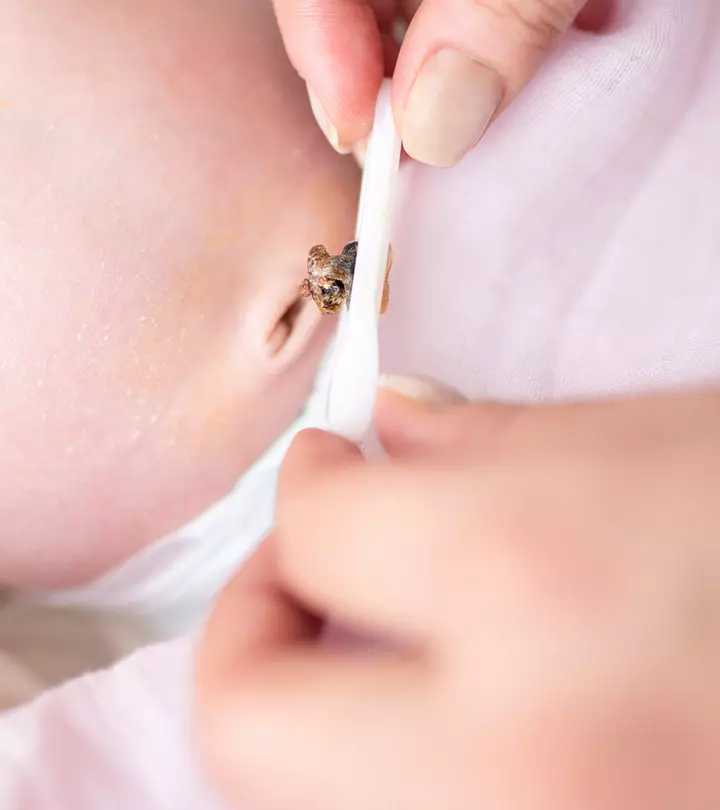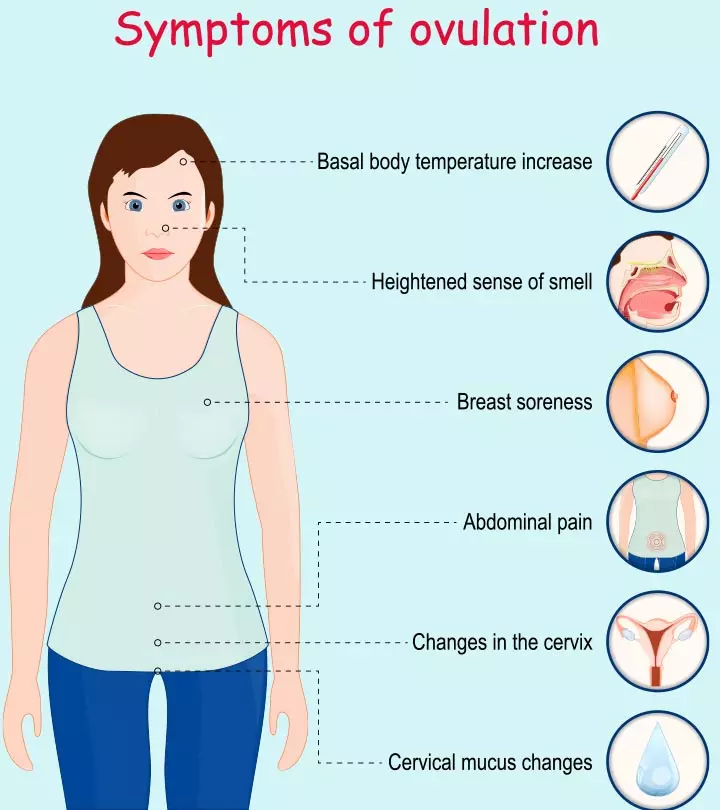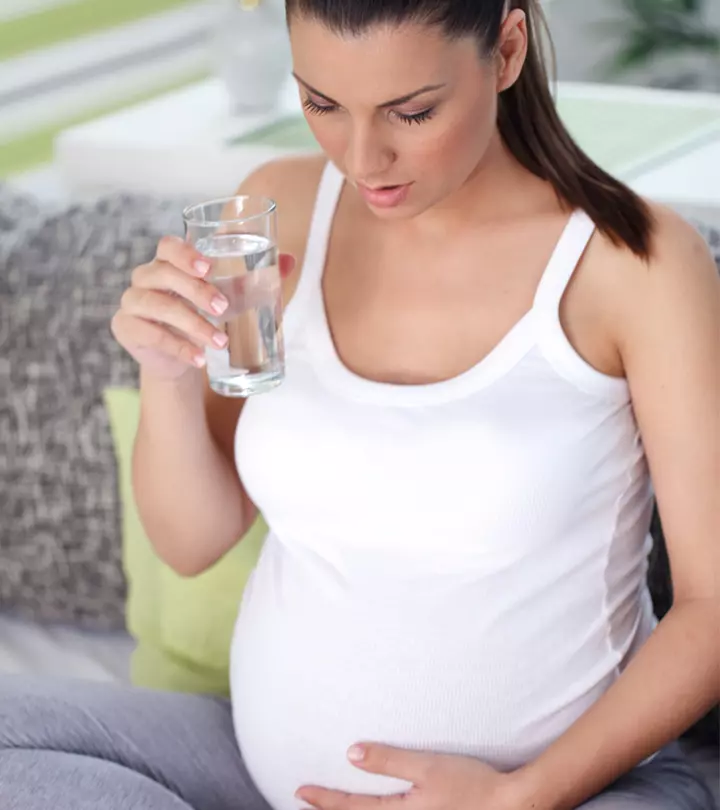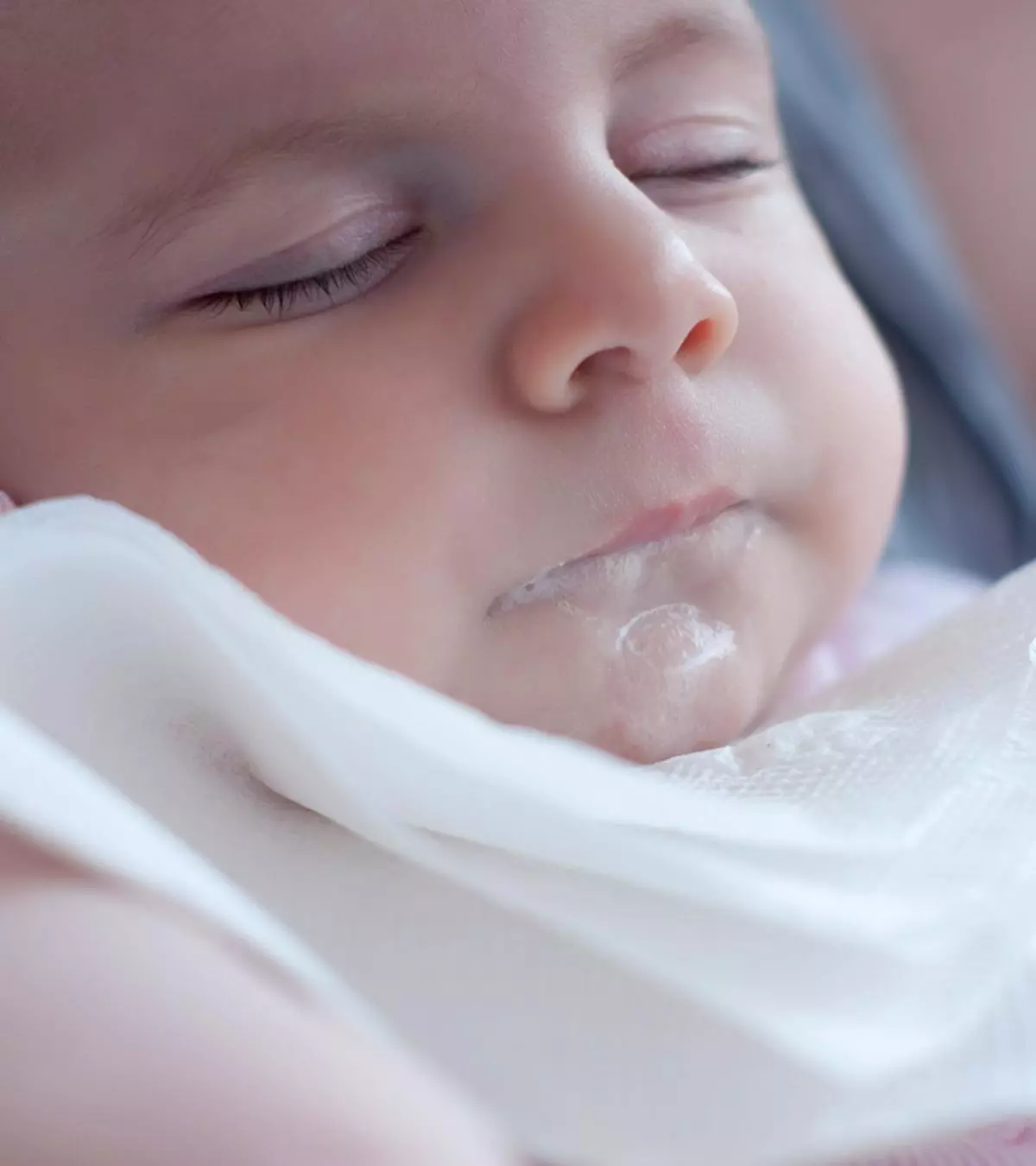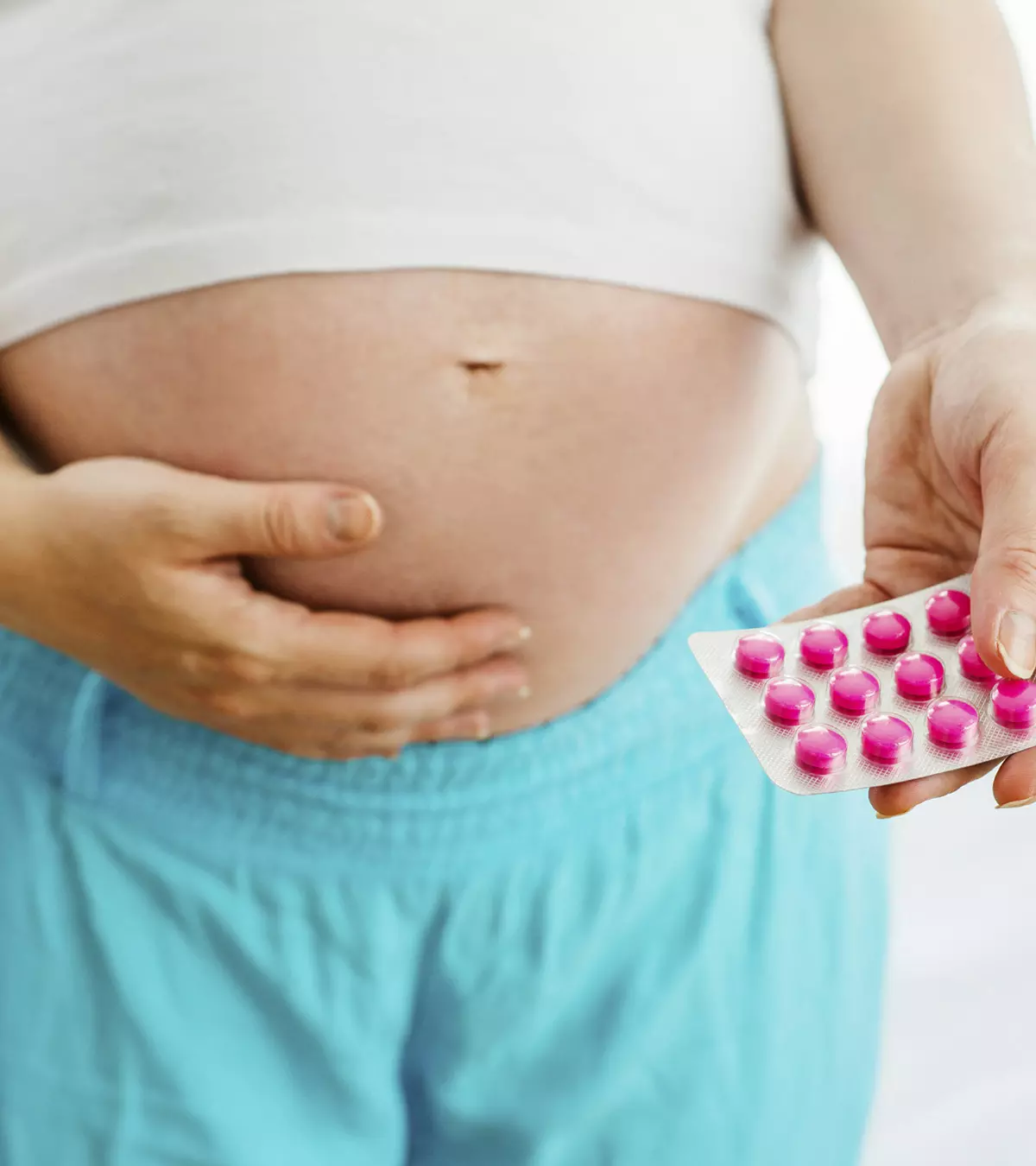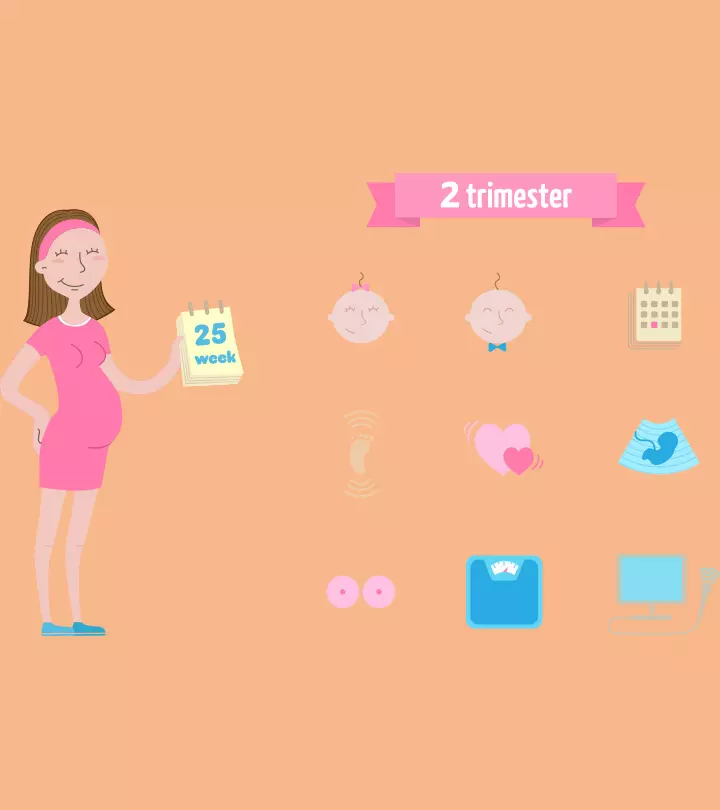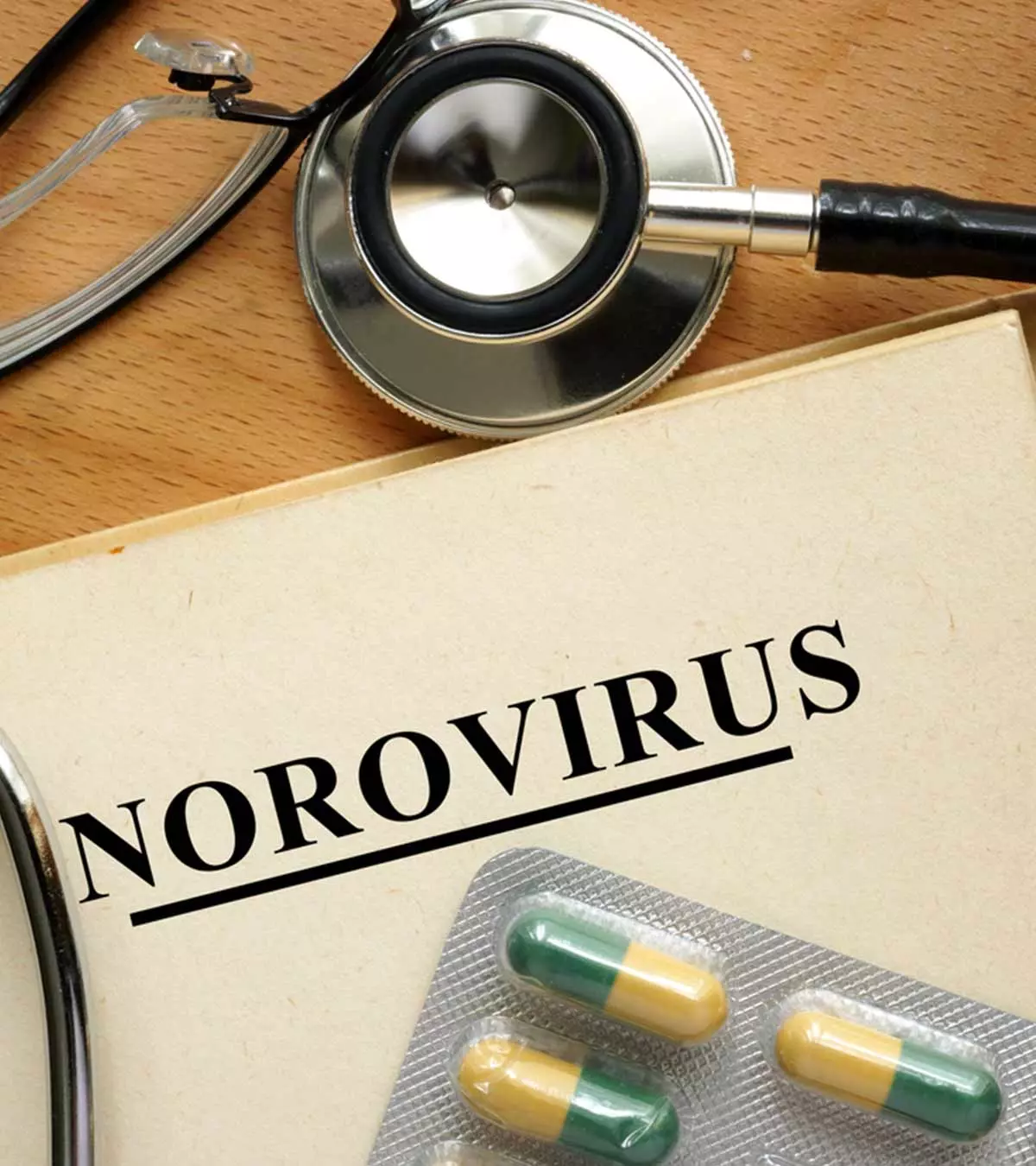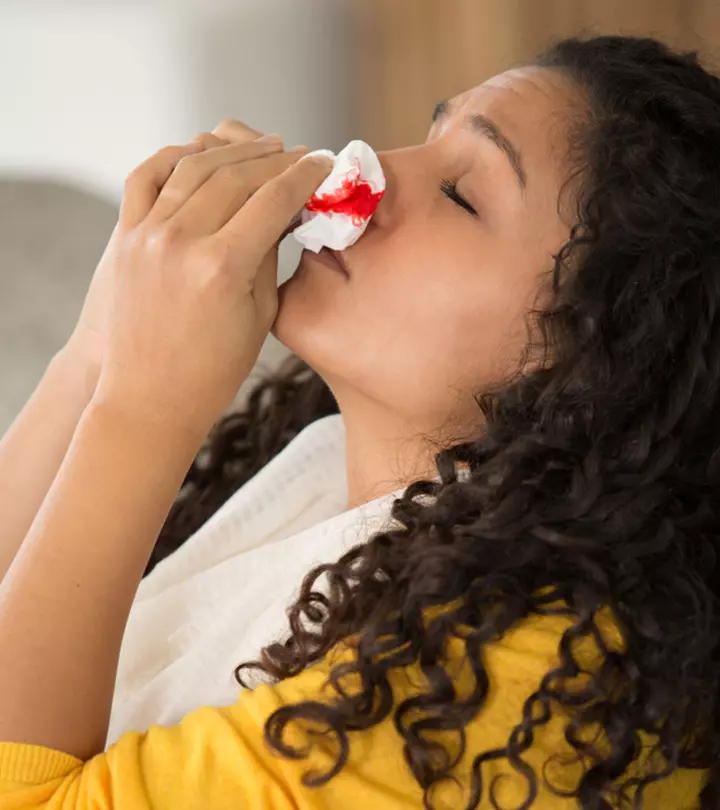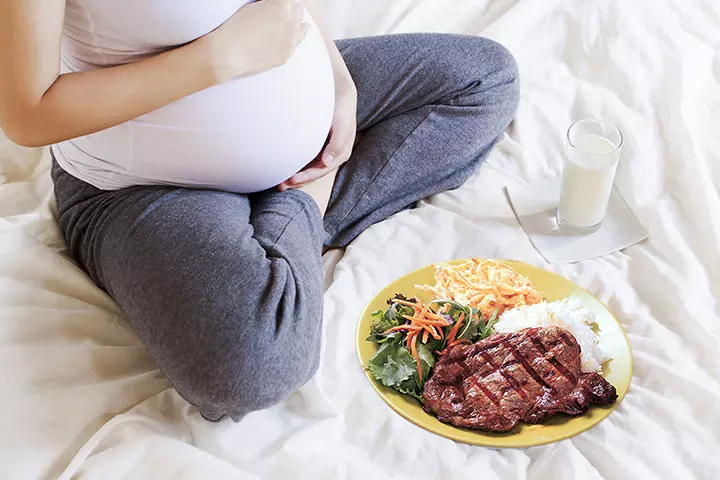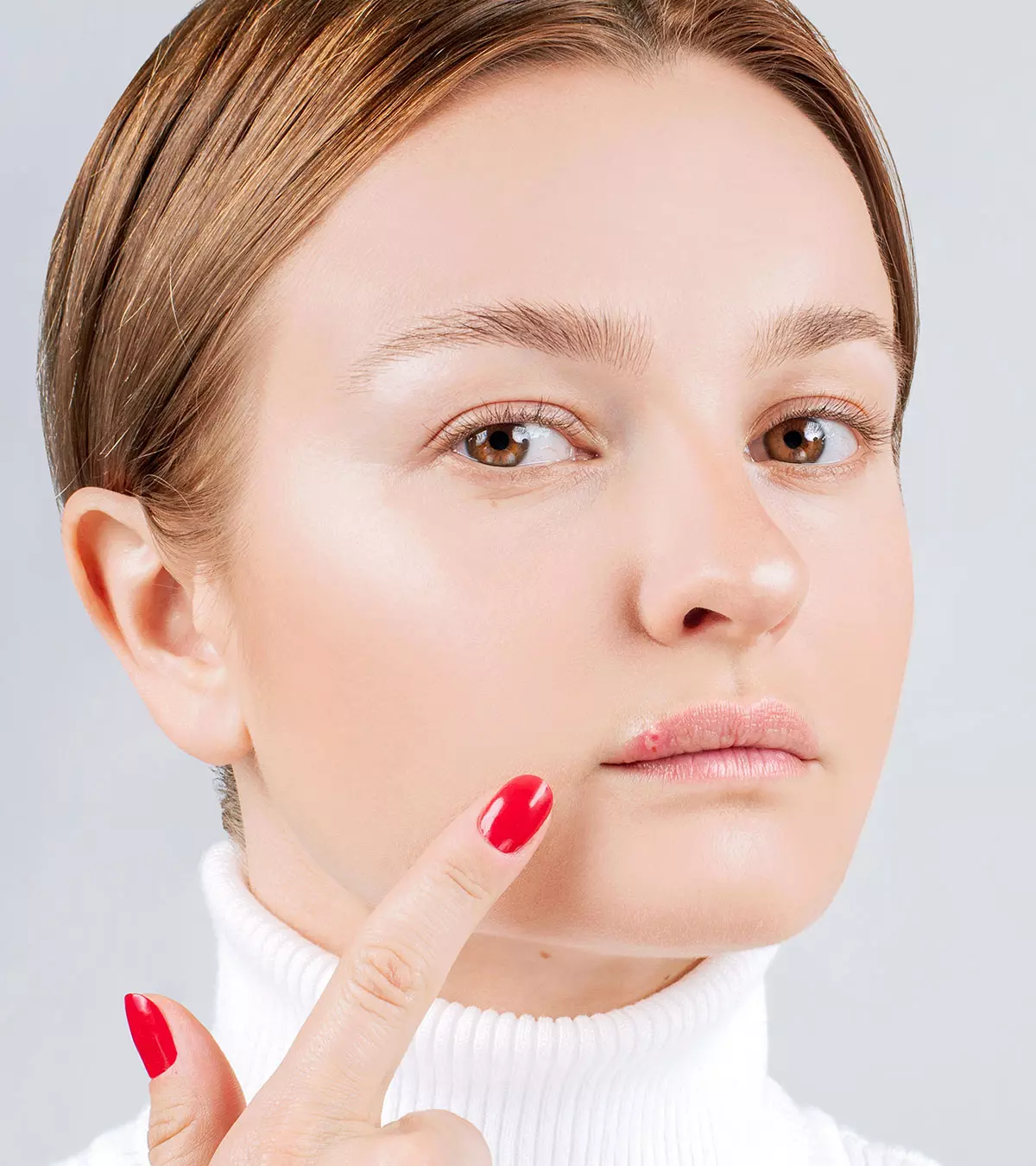
Image: Shutterstock
Cold sores or fever blisters erupt inside the lips or cheeks, around the mouth, or near the nose and chin (1). These itchy and tingly sores might sometimes be painful too. Usually, cold sores are likely to disappear in a couple of weeks. But what happens when they occur during pregnancy? What should you do about them? Keep reading to know more about cold sores during pregnancy.
Key Pointers
- Cold sores are blisters inside the mouth or near the nose, caused by the herpes simplex virus and commonly seen in women with past exposure.
- The virus is contagious, and factors such as hormonal or psychological changes can trigger its occurrence in pregnant women.
- It is not an alarming concern. You may try some effective home remedies or consult your ob/gyn for pregnancy-safe medications.
What Are The Causes Of Cold Sores During Pregnancy?

Cold sores are caused by the herpes simplex viruses named HSV1 and HSV2. The virus transmits from one person to another through skin-to-skin contact during touching, sexual intimacy, kissing, or sharing contaminated items (2). Cold sores are likely to be common in women who have experienced them in the past (3)
Once a woman has contracted the virus, the following risk factors could trigger the cold sore virus.
- Hormonal changes that frequently rise and fall could make the body susceptible to viral infection, including a cold sore outbreak (4).
- Psychological concerns, such as fear and stress during pregnancy could trigger the virus (5).
- Certain foods (acidic, spicy, or salty), citrus fruits, exposure to the sun, and hot water could trigger the virus and cause cold sores (6).
Alexandra Harbushka, a vlogger who deals with recurring herpes, shares her experience with a food she decided to avoid during her pregnancy. She explains, “Things that cause outbreaks for me… which I was like, it’s not going to cause an outbreak—eggplant of all things! Eggplant’s very inflammatory. I love eggplant; I have eggplant in my garden. So I was like, I’m going to eat my eggplant. And every time I ate my eggplant, I got an outbreak. So I’m not eating my eggplant anymore (i).”
- The immune system naturally becomes slightly modulated during pregnancy to support the growing fetus. While the immune system is still functional, protecting the mother and the developing baby is prioritized. This adjustment makes pregnant women more prone to frequent or severe cold sore episodes compared to when they are not pregnant (7).
- Pregnancy often leads to physical exhaustion and disrupted sleep patterns, which can lower immunity and increase the likelihood of a cold sore outbreak (8).
What Are The Signs And Symptoms Of Cold Sores In Pregnancy?

The common signs and symptoms that could indicate cold sores during pregnancy include (9):
- Swelling of the lips
- Small, painful blisters
- Redness
- Tiny bumps over your lips
- Fever
- Pains and aches
- Sore throat
- Headache
There are five stages of a cold sore where you might experience the above symptoms. Understanding the changes in each of these stages might help you take the right steps to prevent them from spreading to other parts of the body.
What Are The Different Stages Of Cold Sores?
The cold sores last for seven to 12 days, and during this time, they might progress in different stages (10).
Stage 1: The tingling stage
You may experience a tingling sensation for about a couple of days. The skin (inside your lips, on your lips, or inside the cheeks) might turn sore and red and might even swell and become itchy.
Stage 2: The blister stage
This stage lasts for about two days. During this stage, new blisters may form and spread to other parts in the absence of proper prenatal care.
Stage 3: The weeping stage
At this stage, the blisters may burst, and you might experience pain. The cold sores might scab over at this point.
Stage 4: The scabbing stage
The scabsiCrusty, dark red or brown layers that keep bacteria out of the wound while allowing the skin cells to recover may crack and even bleed. They could be itchy, but make sure you are not poking them.
Stage 5: The healing stage
In this stage, all the scabs flake off and disappear soon after. Even the scars slowly vanish.
Observe the progress of cold sores and treat them in time to prevent the infection from spreading.
Are Cold Sores Contagious?

According to the World Health Organization (WHO), herpes infections are highly contagious when symptoms such as ‘cold sores’ are present (11). The virus may be passed from one person to another. If the bump ruptures, the active virus could spread via lipstick, cups, utensils, kissing, or through oral sex (12).
According to the UT Southwestern Medical Center, HSV 1 or the cold sore infection could pass from the infected person to the baby. This usually happens when the person kisses the baby or when the baby is touched after the cold sore is touched (13).
Therefore, it is important to treat the cold sore in pregnancy to prevent the virus from spreading to the baby after it is born. Herpes infection is mild for the mother but can be life-threatening for the baby.
 Point to consider
Point to considerWhen To Seek Medical Advice?
Pregnancy requires regular consultation with a doctor for any discomfort. So, if you have cold sores during pregnancy, it is best to seek medical care instead of self-medication. Visit a doctor immediately if you have (9):
- A weakened immune system
- Severe signs like large and painful sores
- Persistent sores that are not healing
- Recurrent sores
- Cold sores that are spreading near your eyes
- Signs of infection like redness around the sores and fever
To identify the infection accurately, a sample from the base of a cold sore might be taken and analyzed under a microscope. Additionally, a PCR (polymerase chain reaction) test can be performed in a pathology laboratory to detect the virus (14).
How To Treat Cold Sores In Pregnancy?
Home care measures for the sores might alleviate pain and discomfort. In some cases, medication may be necessary.
1. Home treatment

You may try some home remedies to ease the cold sore-related pain and discomfort (15):
- Placing a cold compress (wet, cool cloth, or towel) on the sores may help reduce the redness and pain.
- Eating and drinking cool foods and beverages can also make meals more comfortable.
- Apply a lip balm (SPF 30 or higher) before going outside (16).
- Maintain a healthy diet, get enough sleep, and practice relaxation techniques to reduce stress (17).
- Diluted apple cider vinegar, lemon balm, and aloe vera gel are a few natural remedies that may help treat cold sores at home (18).
Consult your doctor to ensure the safety of these natural remedies. Your doctor can provide personalized advice and recommend safe, effective treatments to manage cold sores while prioritizing the health of both you and your baby.
2. Clinical medicine
Before you take any medication for cold sores in pregnancy, talk to your doctor. Ideally, antiviral medications are prescribed to treat cold sores. According to the American Academy of Family Physicians, the common options include valacyclovir, famciclovir, and acyclovir during pregnancy (19). These fall under pregnancy category B medications of the US Food and Drug Administration. While valacyclovir and acyclovir are often recommended for both primary and recurrent HSV infection that causes cold sores, famciclovir is not considered the first choice of drug during pregnancy. A research paper states, “ Studies have shown that the use of acyclovir or valacyclovir is not associated with an increase in birth defects. Limited data exist for famciclovir, and therefore, it would not be considered a first-line choice for treatment of herpes during pregnancy (20).”
If the cold sores get severe, the doctor may change the dose or prescribe other treatment.
Are Cold Sores An Early Sign Of Pregnancy?
Cold sores are common, and it is not uncommon for expecting women to experience them. But they may not be an early sign of pregnancy. A woman may get cold sores at any point during the gestationiThe period between conception and delivery of the baby period.
Are Cold Sores During Pregnancy Harmful To The Baby?
According to the Royal Hospital for Women, Australia, cold sores may not affect newborn babies. But they are infectious and should be treated in time, so they don’t spread to the infant (14). However, if you have genital herpes, then there are chances of the virus transmitting to the baby during the process of childbirth (known as acquired herpes). This can be very dangerous for the baby. Hence, a cesarean section is indicated to avoid contact of the baby with the cold sores.
 Did you know?
Did you know?Frequently Asked Questions
1. Can pregnancy flare-up cold sores?
Pregnancy modulates the immune system, and women who have herpes may have an increased risk of outbreaks of cold sores during pregnancy (2) (7).
2. Can pregnancy hormones cause cold sores?
Cold sores may be triggered due to hormonal changes during pregnancy or menstruation in women already exposed to the herpes simplex virus type 1 (HSV-1) (21).
3. Can I use Abreva for cold sores while pregnant?
The manufacturer’s instruction states that Abreva is not recommended for treating cold sores in pregnant or lactating women unless advised by a doctor (22).
4. Can I use cold sores cream when pregnant?
A doctor may prescribe cold sores creams containing aciclovir, an antiviral medication, for treating cold sores during pregnancy (3).
5. Are cold sores harmful to my baby during pregnancy?
Cold sores caused by the herpes simplex virus in the mouth may not harm the unborn baby. However, if the mother has genital sores, the condition can pass on to the baby through skin contact during birth (13).
6. How can I boost my immunity to prevent cold sores during pregnancy?
Anecdotal studies suggest amino acid supplementation, limiting foods rich in arginine, such as nuts, peanuts and chocolates, using lemon balm, witch hazel, or vitamin E oils on the infected areas, and consuming flavonoid and vitamin C rich foods are likely to help prevent and remedy cold sores (23). However, little is known about their effectiveness and safety during pregnancy, requiring medical consultation. Additionally, you may prevent cold sores by some measures during pregnancy, such as avoiding potential triggers, practicing good hygiene, and using appropriate skincare products.
7. Are there any long-term effects of having cold sores during pregnancy?
Leaving cold sores, especially in the genital area, unaddressed during pregnancy and not taking precautions can put the baby at risk of contracting the disease. This can lead to sensory problems, such as blindness and deafness or cause life-threatening symptoms in the baby (13). In rare cases of internal viral transmission to the baby, the mother is likely to have a higher risk for miscarriage and preterm delivery (24).
8. Do cold sores mean I have an STI?
Dr. Alan Lindemann, obstetrician and maternal mortality expert from North Dakota, says, “Cold sores are not considered to be STIs (sexually transmitted infections). However, one can still acquire HSV-1 during sexual activity due to close contact and kissing. Testing for oral herpes is generally not included in the standard STI panel. But genital herpes, whether it is HSV-1 or HSV-2, is considered to be an STI.”
HSV1 and HSV2 can produce cold sores during pregnancy that can emerge inside the lips or cheeks, near the nose and chin, or around the mouth. The advancement and healing of cold sore stages may take over seven to twelve days, and in different stages. It is advised to avoid touching the sores when they erupt, follow a well-balanced diet, and get plenty of rest to avoid cold sores during pregnancy. Also, stay away from spicy meals and wash your hands frequently. Though cold sores are not a cause for concern during pregnancy, you should visit your doctor and have them treated as soon as possible.
Infographic: Precautions For Cold Sores When Pregnant And Postpartum
For most women who have experienced cold sores before, developing them while pregnant or after having a baby is not uncommon. If you are concerned that cold sores could impact your pregnancy or baby, the safety tips in this infographic could ease your worry and help you prevent them while pregnant, and protect your newborn from acquiring the infection. Illustration: Momjunction Design Team
Illustration: Is It Common To Get Cold Sores (Fever Blisters) During Pregnancy?
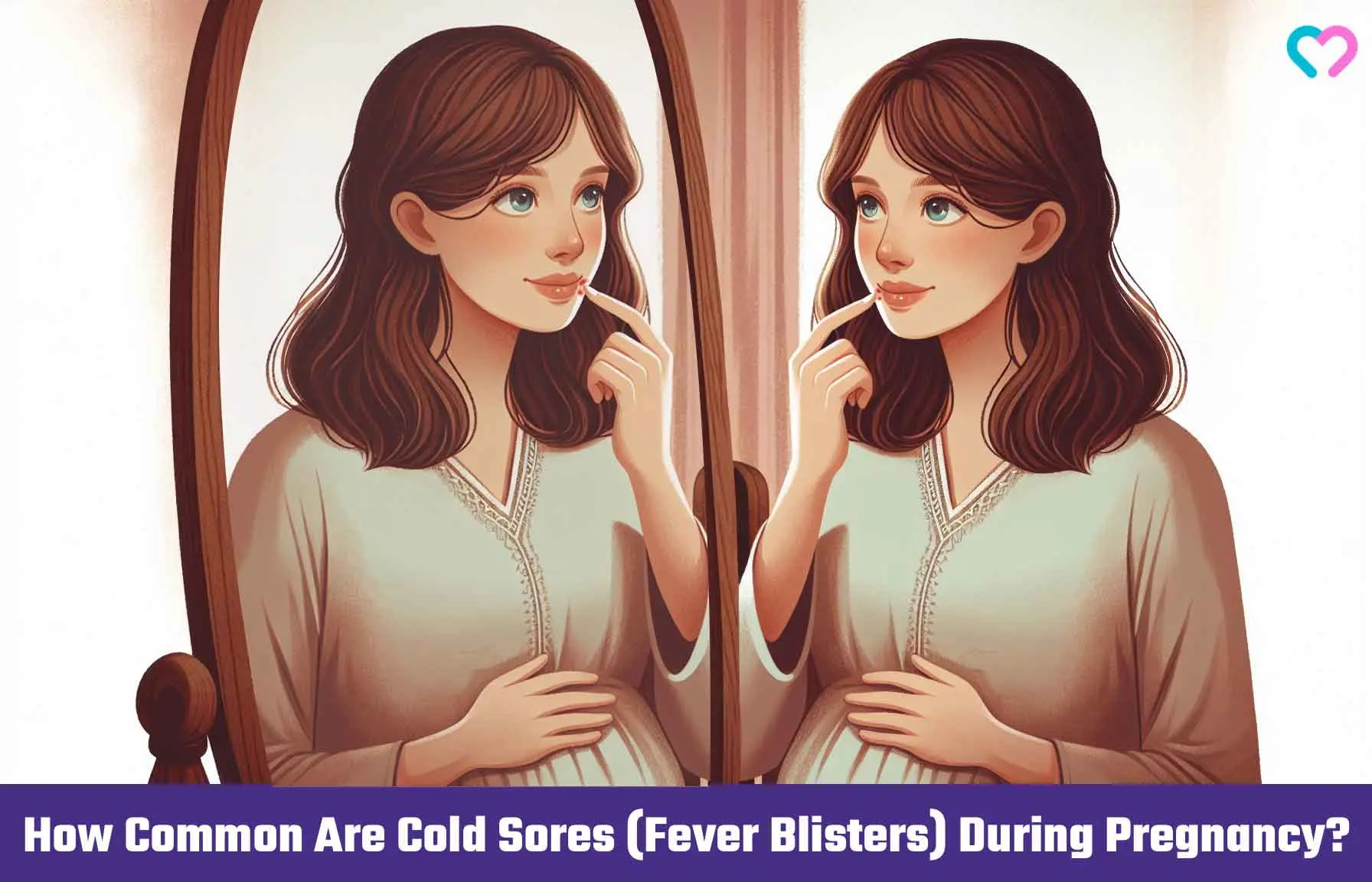
Image: Dall·E/MomJunction Design Team
Personal Experience: Source
MomJunction articles include first-hand experiences to provide you with better insights through real-life narratives. Here are the sources of personal accounts referenced in this article.
i. Herpes and Pregnancy: How Many Outbreaks Did I Get During Pregnancy.
https://youtu.be/empYTgI-L5s?feature=shared
References
- Cold sores.
https://www.betterhealth.vic.gov.au/health/conditionsandtreatments/cold-sores - Cold sores in pregnancy.
https://www.pregnancybirthbaby.org.au/cold-sores-in-pregnancy - Cold sores in Pregnancy and Breastfeeding.
https://www.seslhd.health.nsw.gov.au/sites/default/files/migration/Mothersafe/documents/ColdSores-Mar2016.pdf - Cold Sores.
https://www.uhs.wisc.edu/medical/cold-sores/ - Deborah Blair Donahue; (2001); Diagnosis and Treatment of Herpes Simplex Infection During Pregnancy.
https://www.jognn.org/article/S0884-2175(15)33947-2/pdf - Herpes simplex.
https://www.mountsinai.org/health-library/report/herpes-simplex - Gil Mor and Ingrid Cardenas; (2011); The Immune System in Pregnancy: A Unique Complexity.
https://pmc.ncbi.nlm.nih.gov/articles/PMC3025805/ - Pregnancy & Sleep: Common Issues & Tips for Sleeping.
https://www.sleepfoundation.org/pregnancy - Cold sores.
https://www.healthdirect.gov.au/cold-sores#symptoms - Cold sores.
https://sacd.sdsu.edu/_resources/files/well-being/03724-Cold_Sores_-_English__mufassercom_08-2012.pdf - Herpes simplex virus.
https://www.who.int/news-room/fact-sheets/detail/herpes-simplex-virus - How contagious are cold sores?
https://wexnermedical.osu.edu/our-stories/how-contagious-are-cold-sores - How to protect your baby from herpes infection.
https://utswmed.org/medblog/herpes-simplex-pregnancy-baby/ - Cold sores – including symptoms treatment and prevention.
https://www.sahealth.sa.gov.au/wps/wcm/connect/public+content/sa+health+internet/conditions/infectious+diseases/cold+sores/cold+sores-+including+symptoms+treatment+and+prevention - Cold Sores (HSV-1): Symptoms Causes & Prevention.
https://kidshealth.org/en/teens/cold-sores.html - Cold sores: Diagnosis and treatment.
https://www.aad.org/public/diseases/a-z/cold-sores-treatment - Mouth sores.
https://www.mountsinai.org/health-library/symptoms/mouth-sores - Cold Sores.
https://www.beautifulsmiles.org/cold-sores - ACOG Releases Guidelines on Managing Herpes in Pregnancy.
https://www.aafp.org/pubs/afp/issues/2008/0201/p369.html - So-Hee Kang et.al; (2011); Safety of antiviral medication for the treatment of herpes during pregnancy.
https://pmc.ncbi.nlm.nih.gov/articles/PMC3076471/ - Cold Sores.
https://my.clevelandclinic.org/health/symptoms/cold-sores - Understanding Cold Sores.
https://www.abreva.ca/faq/understanding-cold-sores.html#:~:text=Abreva%20is%20not%20recommended%20tounless%20advised%20by%20a%20doctor - Cold Sores (Holistic).
https://www.peacehealth.org/medical-topics/id/hn-1190007 - Genital herpes: What you should know about sex and pregnancy.
https://www.aad.org/public/diseases/a-z/genital-herpes-pregnancy
Community Experiences
Join the conversation and become a part of our nurturing community! Share your stories, experiences, and insights to connect with fellow parents.
Read full bio of Dr. Ben Abbes Taarji Hicham
- Dr. Alan Lindemann is an obstetrician and maternal mortality expert, who worked as a clinical associate professor at the University of ND. An alumnus of the University of ND and the University of Minnesota, he is a member of the American College of Obstetricians and Gynecologists and the American Medical Association.
 Dr. Alan Lindemann is an obstetrician and maternal mortality expert, who worked as a clinical associate professor at the University of ND. An alumnus of the University of ND and the University of Minnesota, he is a member of the American College of Obstetricians and Gynecologists and the American Medical Association.
Dr. Alan Lindemann is an obstetrician and maternal mortality expert, who worked as a clinical associate professor at the University of ND. An alumnus of the University of ND and the University of Minnesota, he is a member of the American College of Obstetricians and Gynecologists and the American Medical Association.
Read full bio of Rebecca Malachi
Read full bio of Dr. Ritika Shah
Read full bio of Reshmi Das













